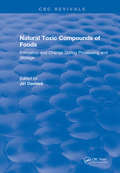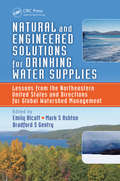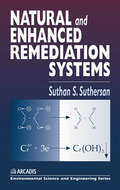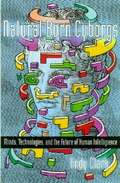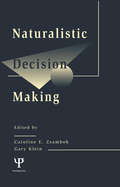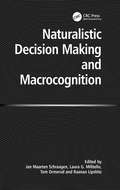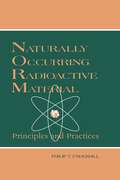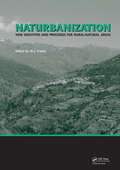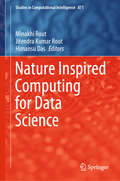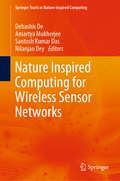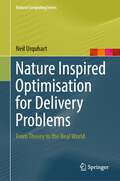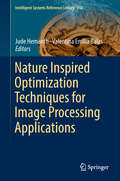- Table View
- List View
Natural Substances for Cancer Prevention
by Jun-Ping XuNatural Substances for Cancer Prevention explores in detail how numerous investigations in chemical biology and molecular biology have established strong scientific evidence demonstrating how the properties of naturally occurring bioactive chemicals hamper all stages of cancers (from initiation to metastasis). Accordingly, important goals for cancer prevention are the modification of our dietary habits and an increase in the intake of more anticancer-related natural substances. More significantly, the bioactive chemicals presented in the functional foods should be readily available, inexpensive, non-toxic, and nutritional.
Natural Surfactants: Application in Enhanced Oil Recovery (SpringerBriefs in Applied Sciences and Technology)
by Neha Saxena Ajay MandalThis book focuses on the use of natural surfactants in enhanced oil recovery, providing an overview of surfactants, their types, and different physical–chemical properties used to analyse the efficiency of surfactants. Natural surfactants discuss the history of the surfactants, their classification, and the use of surfactants in petroleum industry. Special attention has been paid to natural surfactants and their advantages over synthetic surfactants, including analysing their properties such as emulsification, interfacial tension, and wettability and how these can be used in EOR. This book offers an overview for researchers and graduate students in the fields of petroleum and chemical engineering, as well as oil and gas industry professionals.
Natural Toxic Compounds of Foods
by Jiri DavidekThis book summarizes the knowledge of naturally occurring toxic and antinutritive food compounds. It includes those plants and animals of value or potential value for human nutrition, either by direct consumption or indirect. as feed for domestic animals. Also included are toxic and antinutritive compounds formed from food components during processing and storage, as well as the toxic and antinutritive compounds present as natural constituents in raw materials and foodstuffs. FEATURES: Discusses food intolerance-inducing compounds, toxins and toxic compounds; Focuses on the most frequently occurring intolerances; Describes the reaction conditions for the formation of these compounds, as well as for their degradation; Considers nitroso compounds and ethyl carbamate formation.
Natural Ventilation of Buildings
by David EtheridgeNatural ventilation is considered a prerequisite for sustainable buildings and is therefore in line with current trends in the construction industry. The design of naturally ventilated buildings is more difficult and carries greater risk than those that are mechanically ventilated. A successful result relies increasingly on a good understanding of the abilities and limitations of the theoretical and experimental procedures that are used for design.There are two ways to naturally ventilate a building: wind driven ventilation and stack ventilation. The majority of buildings employing natural ventilation rely primarily on wind driven ventilation, but the most efficient design should implement both types.Natural Ventilation of Buildings: Theory, Measurement and Design comprehensively explains the fundamentals of the theory and measurement of natural ventilation, as well as the current state of knowledge and how this can be applied to design. The book also describes the theoretical and experimental techniques to the practical problems faced by designers. Particular attention is given to the limitations of the various techniques and the associated uncertainties.Key features:Comprehensive coverage of the theory and measurement of natural ventilationDetailed coverage of the relevance and application of theoretical and experimental techniques to designHighlighting of the strengths and weaknesses of techniques and their errors and uncertaintiesComprehensive coverage of mathematical models, including CFDTwo chapters dedicated to design procedures and another devoted to the basic principles of fluid mechanics that are relevant to ventilationThis comprehensive account of the fundamentals for natural ventilation design will be invaluable to undergraduates and postgraduates who wish to gain an understanding of the topic for the purpose of research or design. The book should also provide a useful source of reference for more experienced industry practitioners.
Natural Wastewater Treatment Systems
by Robert K. Bastian Ronald W. Crites E. Joe MiddlebrooksCalling for ecologically and economically sound wastewater treatment systems, the authors of Natural Wastewater Treatment Systems explore the use of wetlands, sprinkler or deep irrigation, groundwater recharge, and other natural systems as sustainable methods for the treatment and management of wastewater. Based on work by prominent experts in natu
Natural and Cultural Diversity in the Himalaya (SpringerBriefs in Environmental Science)
by Vishwambhar Prasad SatiThe Himalaya is the new folded mountain system – the tallest and the youngest in the world. It has a rich diversity – natural and cultural, and diversity in all walks of life. Most of its uniqueness is unknown because of its remoteness. Even, the native people are not aware of them. This book aims to describe the uniqueness of the Central Himalaya in terms of its natural and cultural diversity in detail. Supported by original figures and primary data, this book is empirically tested. It is mainly based on observation and participation and the use of a qualitative approach. Although lots of work has been carried out on the various aspects of the Himalayan region yet, a detailed description of the natural and cultural diversity is yet to be done. This book steps forward to elaborate on some of the unique natural and cultural features of the Central Himalaya, which are worthy to be known about. It contains a total of 10 chapters. Four chapters are devoted to natural diversity and four chapters comprise cultural diversity. Besides, the introduction and conclusions are the first and the last chapters of the book, respectively. The book is the first of its kind and will be useful to all stakeholders – students of all standards, research scholars, academicians, policymakers, native people, tourists, and the general public.
Natural and Engineered Solutions for Drinking Water Supplies: Lessons from the Northeastern United States and Directions for Global Watershed Management
by Mark S. Ashton Emily Alcott Bradford S. GentryIlluminating opportunities to develop a more integrated approach to municipal water system design, Natural and Engineered Solutions for Drinking Water Supplies: Lessons from the Northeastern United States and Directions for Global Watershed Management explores critical factors in the decision-making processes for municipal water system delivery. Th
Natural and Enhanced Attenuation of Contaminants in Soils, Second Edition
by Raymond N. Yong Catherine N. MulliganNatural attenuation has become an effective and low-cost alternative to more expensive engineered remediation. This new edition updates the principles and fundamentals of natural attenuation of contaminants with a broader view of the field. It includes new methods for evaluating natural attenuation mechanisms and microbial activity at the lab and field scales. Case studies, actual treatments and protocols, theoretical processes, case studies, numerical models, and legal aspects in the natural attenuation of organic and inorganic contaminants are examined. Challenges and future directions for the implementation of natural attenuation and enhanced remediation techniques are also considered.
Natural and Enhanced Remediation Systems
by Suthan S. SuthersanBuilding on the success of bioremediation and phytoremediation technologies, Natural and Enhanced Remediation Systems explores remediation techniques that use the beneficial effects provided by Mother Nature. Written by a leader in the industry, the book provides state-of-the-art information on natural and enhanced remediation techniques such as mo
Natural and Synthetic Fiber Reinforced Composites: Synthesis, Properties and Applications
by Suchart Siengchin Sanjay M. Rangappa Dipen Kumar RajakNatural and Synthetic Fiber Reinforced Composites Discover a comprehensive exploration of fiber reinforced polymers by an expert team of editors Fiber reinforced polymer (FRP) composites offer several unique properties that make them ideal for use in a wide range of industries, from automotive and aerospace to marine, construction, and co-industrial. In Natural and Synthetic Fiber Reinforced Composites: Synthesis, Properties and Applications, a distinguished team of mechanical engineers delivers a comprehensive overview of fiber reinforced composites. This edited volume includes thorough discussions of glass-, cotton-, and carbon-fiber reinforced materials, as well as the tribological properties and non-structural applications of synthetic fiber composites. Readers will also find practical explorations of the structural evolution, mechanical features, and future possibilities of fiber, textile, and nano-cementitious materials. The physical and chemical properties of cotton fiber-based composites are explored at length, as are the extraordinary mechanical, thermal, electrical, electronic, and field emission properties of carbon nanotubes. This singular book also includes: A thorough discussion of recent advancements in natural fiber reinforced polymer composites, their implications, and the opportunities that arise as a result A comprehensive exploration of the thermal behavior of natural fiber-based composites An insightful review of the literature on sisal fiber with polymer matrices A response to the growing research gap in the existing literature regarding natural fiber-based polymer composites and solutions to address it Perfect for scientists, engineers, professors, and students working in areas involving natural and synthetic reinforced polymers and composites, Natural and Synthetic Fiber Reinforced Composites: Synthesis, Properties and Applications offers a one-of-a-kind resource to help readers understand a critical and rapidly evolving technology.
Natural and Synthetic Waxes: Origin, Production, Technology, and Applications
by Ernst J. Krendlinger Uwe H. WolfmeierNatural and Synthetic Waxes A compilation of all relevant information for the production and use of waxes in technical applications Waxes are among the oldest organic substances used by mankind. Before all others, beeswax is known to have played a role in human history for thousands of years. But over time, many other wax species have been detected and exploited, and prepared for different utilizations. Today, we possess knowledge of a great variety of different types of waxes. Unfortunately, there still is no broadly accepted definition of a wax: for the relatively few wax chemists, waxes are usually defined by their physico-chemical properties more than by their chemical constitution. Waxes are not uniform but oligomeric and polymeric substances, not simply describable with a chemical formula. The realm of waxes encompasses fully or partly natural, refined, partly or fully synthetic products, which can be extended by “wax-like” products which do not fulfil all definition criteria. Waxes are offered in different forms like pellets, granules, powders, or micropowders. Their number of technical applications runs into thousands. However, waxes in most cases are just adjuvants or additives, and with few exceptions like candles not known to a broader public. Only few publications over the last decades tried to present a more comprehensive overview of heir chemistry, chemical composition, their physical and analytical properties, their applications, and their sometimes astonishing history. Based on personal experience and expertise, the authors intend to present an overview on the main classes of waxes, their origin, history, future, and potential fate. Economical aspects like market size and development, ecological impacts and challenges, and regulatory issues are also addressed. Waxes are indispensable products in everyday life and in industry and technology, though mostly not even visible or distinguishable to experts. They deserve more than the role of a “poor cousin” in chemistry and technology.
Natural-Born Cyborgs: Minds, Technologies, and the Future of Human Intelligence
by Andrew J. ClarkCognitive scientist Clark believes we are liberating our minds, thanks to our penchant for inventing tools that extend our abilities to think and communicate, starting with the basics of pen and paper and moving on to ever more sophisticated forms of computers. In this lively and provocative treatise, Clark declares that we are, in fact, "human-technology symbionts" or "natural-born cyborgs," always seeking ways to enhance our biological mental capacities through technology, an intriguing claim he supports with a brisk history of "biotechnology mergers," which currently range from pacemakers to the way a pilot of a commercial airplane is but one component in an elaborate "biotechnological problem-solving matrix." Cell phones, Clark explains, are "a prime, if entry-level cyborg technology," as are Internet search engines. As Clark clearly and cheerfully discusses cognitive processes, how we build "better worlds to think in," opaque versus transparent technologies, and the fluidity of our sense of self and adaptation to environmental changes, he offers hope that our brainy species can use its ever-evolving
Naturalistic Decision Making (Expertise: Research and Applications Series)
by Gary Klein Caroline E. ZsambokIf you aren't using the term naturalistic decision making, or NDM, you soon will be. Even as a very young field, NDM has already had far-reaching applications in areas as diverse as management, aviation, health care, nuclear power, military command and control, corporate teamwork, and manufacturing. Put simply, NDM is the way people use their experience to make decisions in the context of a job or task. Of particular interest to NDM researchers are the effects of high-stake consequences, shifting goals, incomplete information, time pressure, uncertainty, and other conditions that are present in most of today's work places and that add to the complexity of decision making. Applications of NDM research findings target decision aids and training that help people in their decision-making processes. This book reports the findings of top NDM researchers, as well as many of their current applications. In addition, the book offers a historical perspective on the emergence of this new paradigm, describes recent theoretical and methodological advancements, and points to future developments. It was written for people interested in decision making research and applications relative to a diverse array of work settings and products such as human-computer interfaces, decision support systems, individual and team training, product designs, and organizational development and planning.
Naturalistic Decision Making and Macrocognition
by Jan Maarten SchraagenThis book presents the latest work in the area of naturalistic decision making (NDM) and its extension into the area of macrocognition. It contains 18 chapters relating research centered on the study of expertise in naturalistic settings, written by international experts in NDM and cognitive systems engineering. The objective of the book is to present the reader with exciting new developments in this field of research, which is characterized by its application-oriented focus. The work addresses only real-world problems and issues. For instance, how do multi-national teams collaborate effectively? How can surgeons best be supported by technology? How do detectives make sense of complex criminal cases? In all instances the studies have been carried out on experts within their respective domains. The traditional field of NDM is extended in this work by focusing on macrocognitive functions other than decision making, namely sense-making, coordination and planning. This has broadened the scope of the field. The book also contains a theoretical discussion of the macro-micro distinction. Naturalistic Decision Making and Macrocognition will be relevant to graduate students, researchers and professionals (including professionals and researchers in business, industry and government) who are interested in decision making, expertise, training methods and system design. The material may be used in two ways: theoretically, to advance understanding of the field of naturalistic decision making; and practically, to gain insight into how experts in various domains solve particular problems, understand and deal with issues and collaborate with others.
Naturally Based Biomaterials and Therapeutics
by Sujata K. Bhatia Veda EswarappaThis book advances biomedical innovations to address the plethora of health problems afflicting the developing world. A panoply of cultural, economic, infrastructural, and other factors prevent many interventions currently popular in the developed world from being similarly effective in the developing world. This book discusses less-traditional approaches, such as naturally based biomaterials and therapeutics, an area that has traditionally been overlooked but has also demonstrated impressive potential for health applications in recent years. This book explores precisely the kinds of applications which can enable countries like India to access more effective, inexpensive treatments while also taking more ownership of their healthcare technologies and innovations.
Naturally Occurring Radioactive Materials: Principles and Practices
by T.Rick IrvinManagement of Naturally Occurring Radioactive Materials - known in the industry as NORM -has become an important part of the regular training required for workers in oil and gas production, refinery and petrochemical manufacturing, and in certain types of mining. Proper handling of NORM-contaminated wastes and use of appropriate radiation detection and protective equipment are now understood to be important components of good worker safety programs. Until now, no practical, easy-to-read, book was available to supplement worker training courses on NORM management. Naturally Occurring Radioactive Materials: Principles and Practices fills this void by providing, in a single publication, an ideal reference for industry managers, supervisors and line personnel. The book stresses the proper handling and management of NORM contaminated wastes and provides a firm understanding of the chemical properties of radioactive agents, their toxicological effects, and the appropriate containerization and disposal methods for these materials.
Naturally Ventilated Buildings: Building for the senses, the economy and society
by Derek Clements-CroomeWhile there are many historical examples of successful naturally ventilated buildings, standards for indoor climate have tended to emphasise active, mechanical airflow systems rather than passive natural systems. Despite its importance, knowledge about the performance of naturally ventilated buildings has remained comparatively sparse. With ten key research papers this book seeks to address this lack of information.
Naturbanization: New identities and processes for rural-natural areas
by M. J. PradosAs the growth of the worlds population requires the continued search for residential space, the urbanization of natural lands is an inevitable process, but that process does not have to be one that is accomplished without regard for environmental quality. This book presents the unique perspective of naturbanization, the urbanization of protected a
Nature Driven Urbanism (Contemporary Urban Design Thinking)
by Rob RoggemaThis book discusses the way that a nature-driven approach to urbanism can be applied at each of the urban scales; architectural design, urban design of neighborhoods, city planning and landscape architecture, and at the city and regional scales. At all levels nature-driven approaches to design and planning add to the quality of the built structure and furthermore to the quality of life experienced by people living in these environments. To include nature and greening to built structures is a good starting point and can add much value. The chapter authors have fiducia in giving nature a fundamental role as an integrated network in city design, or to make nature the entrance point of the design process, and base the design on the needs and qualities of nature itself. The highest existence of nature is a permanent ecosystem which endures stressors and circumstances for a prolonged period. In an urban context this is not always possible and temporality is an interesting concept explored when nature is not a permanent feature. The ecological contribution to the environment, and indirect dispersion of species, from a temporary location will, overall add biodiversity to the entire system.
Nature Farming and Microbial Applications
by Hiu-lian Xu Hiroshi Umemura James F. Parr JrProduce more abundant, high-quality crops with the information you'll find in this book!Recent concerns over environmental pollution and food quality degradation caused by the excessive use of chemicals have prompted scientists and policymakers to re-evaluate modern agricultural processes and search for alternatives that will aid in the production of healthy foods and the protection of our environment. Nature Farming and Microbial Applications summarizes current research in the field, highlighting unique practices such as the use of microbial inoculants and various alternatives to chemical fertilizers and pesticides. The principles of nature farming, as set forth by Japanese philosopher Mokichi Okada, must fulfill these requirements: producing safe and nutritious food that promotes good health providing economic and spiritual benefits to both producers and consumers being sustainable and easily practiced conserving and protecting the environment producing sufficient high-quality food for an expanding world populationTo this end, Nature Farming and Microbial Applications addresses issues of concern to organic farmers, including: soil fertility pest control effective microorganisms photosynthesis transpiration plant-water relations stress resistance of growing cropsThis well-referenced volume contains unique and original methods of modeling and analysis. It will be used again and again as a reference source for students and researchers.
Nature Guiding
by William Gould VinalNature Guiding is the science of inculcating nature enthusiasm, nature principles, and nature facts into the spirit of individuals. "Doing" nature-study means observing, wondering, and solving problems. It could include collecting, building, measuring, painting, planning, writing, touching, experimenting or any of a wide range of other activities. Most importantly, it allows children to be "original investigators."This book is intended as a resource for teachers and students engaged in nature study at summer camps and in schools. William Gould Vinal believed that the teacher of nature study should be "in sympathy with the simple life and the country way," that the nature study should emphasize observation of the interactions of plants and animals in their environment, and not be reduced to matters of taxonomy and anatomy. In Nature Guiding, he offers advice to camp counselors and school teachers on incorporating nature study into everyday activities, as well as suggestions for parents and others about using visits to state and national parks to teach nature lore.
Nature Inspired Computing for Data Science (Studies in Computational Intelligence #871)
by Himansu Das Minakhi Rout Jitendra Kumar RoutThis book discusses the current research and concepts in data science and how these can be addressed using different nature-inspired optimization techniques. Focusing on various data science problems, including classification, clustering, forecasting, and deep learning, it explores how researchers are using nature-inspired optimization techniques to find solutions to these problems in domains such as disease analysis and health care, object recognition, vehicular ad-hoc networking, high-dimensional data analysis, gene expression analysis, microgrids, and deep learning. As such it provides insights and inspiration for researchers to wanting to employ nature-inspired optimization techniques in their own endeavors.
Nature Inspired Computing for Wireless Sensor Networks (Springer Tracts in Nature-Inspired Computing)
by Debashis De Nilanjan Dey Amartya Mukherjee Santosh Kumar DasThis book presents nature inspired computing applications for the wireless sensor network (WSN). Although the use of WSN is increasing rapidly, it has a number of limitations in the context of battery issue, distraction, low communication speed, and security. This means there is a need for innovative intelligent algorithms to address these issues.The book is divided into three sections and also includes an introductory chapter providing an overview of WSN and its various applications and algorithms as well as the associated challenges. Section 1 describes bio-inspired optimization algorithms, such as genetic algorithms (GA), artificial neural networks (ANN) and artificial immune systems (AIS) in the contexts of fault analysis and diagnosis, and traffic management. Section 2 highlights swarm optimization techniques, such as African buffalo optimization (ABO), particle swarm optimization (PSO), and modified swarm intelligence technique for solving the problems of routing, network parameters optimization, and energy estimation. Lastly, Section 3 explores multi-objective optimization techniques using GA, PSO, ANN, teaching–learning-based optimization (TLBO), and combinations of the algorithms presented. As such, the book provides efficient and optimal solutions for WSN problems based on nature-inspired algorithms.
Nature Inspired Optimisation for Delivery Problems: From Theory to the Real World (Natural Computing Series)
by Neil UrquhartThis book explains classic routing and transportation problems and solutions, before offering insights based on successful real-world solutions. The chapters in Part I introduce and explain the traveling salesperson problem (TSP), vehicle routing problems (VRPs), and multi-objective problems, with an emphasis on heuristic approaches and software engineering aspects. In turn, Part II demonstrates how to exploit geospatial data, routing algorithms, and visualization. In Part III, the above techniques and insights are combined in real-world success stories from domains such as food delivery in rural areas, postal delivery, workforce routing, and urban logistics.The book offers a valuable supporting text for advanced undergraduate and graduate courses and projects in Computer Science, Engineering, Operations Research, and Mathematics. It is accompanied by a repository of source code, allowing readers to try out the algorithms and techniques discussed.
Nature Inspired Optimization Techniques for Image Processing Applications (Intelligent Systems Reference Library #150)
by Valentina Emilia Balas Jude HemanthThis book provides a platform for exploring nature-inspired optimization techniques in the context of imaging applications. Optimization has become part and parcel of all computational vision applications, and since the amount of data used in these applications is vast, the need for optimization techniques has increased exponentially. These accuracy and complexity are a major area of concern when it comes to practical applications. However, these optimization techniques have not yet been fully explored in the context of imaging applications. By presenting interdisciplinary concepts, ranging from optimization to image processing, the book appeals to a broad readership, while also encouraging budding engineers to pursue and employ innovative nature-inspired techniques for image processing applications.


